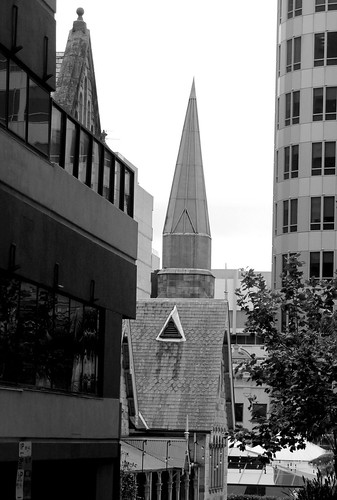Zeus and Hermes came disguised as ordinary peasants, and began asking the people of the town for a place to sleep that night. They were rejected by all before they came to Baucis and Philemon's simple rustic cottage. Though the couple were poor, their generosity far surpassed that of their rich neighbours, at whose homes the gods found "all the doors bolted and no word of kindness given, so wicked were the people of that land."
After serving the two guests food and wine (which Ovid depicts with pleasure in the details), Baucis noticed that, although she had refilled her guest's beechwood cups many times, the pitcher was still full (from which derives the phrase "Mercury's Pitcher"). Realising that her guests were gods, she and her husband "raised their hands in supplication and implored indulgence for their simple home and fare." Philemon thought of catching and killing the goose that guarded their house and making it into a meal, but when he went to do so, it ran to safety in Zeus's lap. Zeus said they need not slay the goose and that they should leave the town. This was because he was going to destroy the town and all those who had turned them away and not provided due hospitality. He told Baucis and Philemon to climb the mountain with him and Hermes, not to turn back until they reached the top.
In Matthew in the scriptures in chapter 25 Jesus tells a similar story. He says, "Who are you? I never knew you." Because he said, "If you do it for the least of them you have done it unto me". People only were nice to those they felt they could benefit from and not in the act of love. Jesus points out that he was the prisoner they turned away and the homeless man they ignored etc.After climbing to the summit ("as far as an arrow could shoot in one pull"), Baucis and Philemon looked back on their town and saw that it had been destroyed by a flood and that Zeus had turned their cottage into an ornate temple. The couple's wish to be guardians of the temple was granted. They also asked that when time came for one of them to die, that the other would die as well. Upon their death, the couple were changed into an intertwining pair of trees, one oak and one linden, standing in the deserted boggy terrain.
This is the wisdom that is to be found, there is no division. One cannot turn their backs from another ones suffering and consider themselves enlightened in any way shape of form. The great unwashed to have a story and they are apart of the divinity too.
However this has an opposite side, one must not throw pearls after swine. One should not allow ones self or important resources to be abused. There has to be a noticeable change occur in the complainant and this understanding if there is evident from the beginning. This is the limitation of personal attitude.
Attitude is a very personal thing its the outward sign of what is within. It is our disposition we display and our face we show the world. I feel it is a hint to the heart energy within the mortal body that retains the divine spark, where there is light there can be no dark. Absolute truth cannot corrupt itself.
In the Old Testament there is the story of Lot and his wife as they leave the city. He asks his wife not to turn around or she would be turned into a pillar of salt.
Salt is a crystal and I find this interesting. Lot is saying to his wife here, "You will not go any further in your journey [vibratory core]. You will be stuck where you are.
The advice to us here is this - Do not look back on the past other than to learn and keep moving onwards. She didn't listen and was turned to Salt. This shows Humanity not moving to Divinity. Salt being the salt of the Earth.
I feel it also shows us that our past can be made into a shrine or temple as an outward sign to show these changes that have occurred inwardly in our soul.
 |
| Image : "Jupiter and Mercurius in the house of Philemon and Baucis" (1630/1633); by Rubens. Kunsthistorisches Museum, Vienna. |
A young man who was to be a lawyer changed his mind and became a poet and wrote works that eventually had him banished from the Roman Empire to a place in Romany called Tomis.

No comments:
Post a Comment